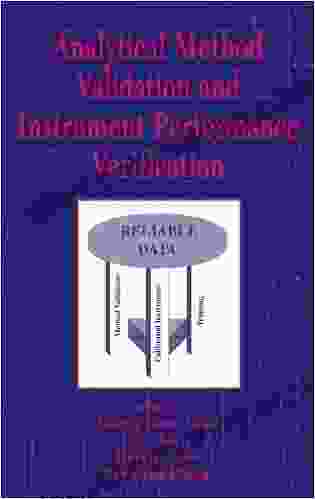In the ever-evolving landscape of scientific research and industrial applications, the integrity of analytical data is paramount. Analytical method validation and instrument performance verification play a crucial role in ensuring that the data generated from analytical instruments is accurate, reliable, and defensible. This comprehensive guide will delve into the intricacies of these essential processes, empowering you with the knowledge and techniques to elevate your laboratory's performance to new heights.
5 out of 5
| Language | : | English |
| File size | : | 3700 KB |
| Text-to-Speech | : | Enabled |
| Screen Reader | : | Supported |
| Word Wise | : | Enabled |
| Print length | : | 320 pages |
| Lending | : | Enabled |
Chapter 1: Analytical Method Validation
Analytical method validation is the process of demonstrating that an analytical method is suitable for its intended purpose. This involves evaluating various performance characteristics of the method, including accuracy, precision, specificity, linearity, range, and robustness. The validation process ensures that the method produces consistent and reliable results over time.
Choosing the Right Validation Approach
The choice of validation approach depends on the intended use of the method. For routine applications, a simpler validation approach may suffice, while more complex methods may require a more rigorous approach.
Understanding Accuracy and Precision
Accuracy refers to the closeness of the measured value to the true value, while precision describes the reproducibility of the results. Both accuracy and precision are essential for ensuring data integrity.
Assessing Specificity and Selectivity
Specificity refers to the method's ability to distinguish the analyte of interest from other substances present in the sample. Selectivity is a related concept that describes the method's ability to differentiate between closely related compounds.
Evaluating Linearity, Range, and Detection Limit
Linearity refers to the proportional relationship between the signal response and the concentration of the analyte. The range of the method defines the concentration limits within which the method is valid. The detection limit is the lowest concentration of the analyte that can be reliably detected.
Ensuring Robustness and Stability
Robustness refers to the method's ability to withstand small changes in experimental conditions without affecting the results. Stability assesses the method's performance over time to ensure that it remains reliable.
Chapter 2: Instrument Performance Verification
Instrument performance verification is the process of ensuring that an analytical instrument is operating within its specified performance specifications. This involves regular checks and calibrations to maintain the instrument's accuracy, precision, and reliability.
Importance of Instrument Calibrations
Calibration is a critical step in ensuring accurate measurements. Regular calibrations verify the instrument's response to known standards and adjust its settings accordingly.
Understanding Preventative Maintenance
Preventative maintenance is essential for maintaining instrument performance and minimizing downtime. Regular inspections and servicing help to identify and resolve potential issues before they impact the instrument's performance.
Conducting System Suitability Tests
System suitability tests are performed to assess the instrument's performance before analyzing samples. These tests verify that the instrument is operating within acceptable parameters and that the data generated is reliable.
Establishing Acceptance Criteria
Acceptance criteria define the acceptable range of instrument performance parameters. Establishing clear acceptance criteria ensures that the instrument meets the required performance specifications.
Troubleshooting Instrument Issues
Instrument performance issues are inevitable. The ability to troubleshoot and resolve these issues effectively is critical for maintaining laboratory productivity and data integrity.
Chapter 3: Quality Control and Data Management
Quality control and data management are essential components of analytical method validation and instrument performance verification. Proper quality control measures ensure that data generated from the laboratory is accurate, reliable, and traceable.
Implementing Quality Control Procedures
Quality control procedures involve the regular analysis of control samples to monitor the method's performance and identify any potential issues.
Managing Analytical Data
Proper data management practices ensure that analytical data is stored, organized, and accessible in a secure and compliant manner.
Importance of Laboratory Accreditation
Laboratory accreditation demonstrates a laboratory's commitment to quality and compliance. Accredited laboratories undergo rigorous assessments to ensure that their methods and practices meet recognized standards.
Chapter 4: Regulatory Compliance
In many industries, analytical methods and instrument performance must comply with regulatory requirements. This chapter explores the regulatory landscape and provides guidance on how to ensure compliance.
Understanding Regulatory Requirements
Regulatory requirements vary depending on the industry and application. It is essential to understand the applicable regulations and implement appropriate measures to comply.
Meeting Regulatory Expectations
Meeting regulatory expectations involves establishing a quality management system, maintaining documentation, and ensuring that staff is adequately trained.
Consequences of Non-Compliance
Non-compliance with regulatory requirements can have serious consequences, including legal liability, loss of accreditation, and damage to reputation.
Analytical method validation and instrument performance verification are essential practices for ensuring the integrity of analytical data. By following the principles and techniques outlined in this comprehensive guide, you can establish a robust validation and verification program that will elevate your laboratory's performance and ensure that your data is always accurate, reliable, and defensible.
Embrace the principles of analytical method validation and instrument performance verification, and embark on a journey to elevate your laboratory's performance and establish yourself as a leader in your field.


























































































